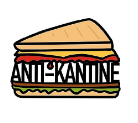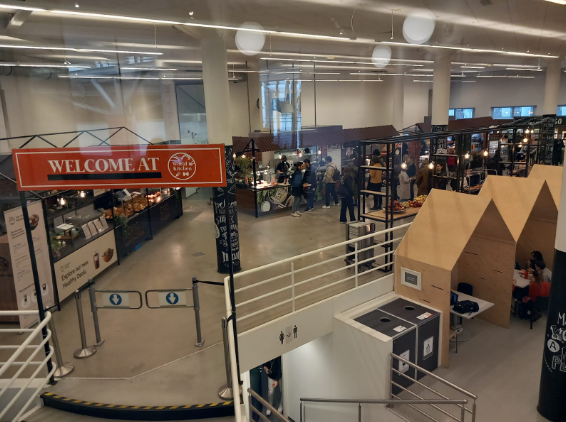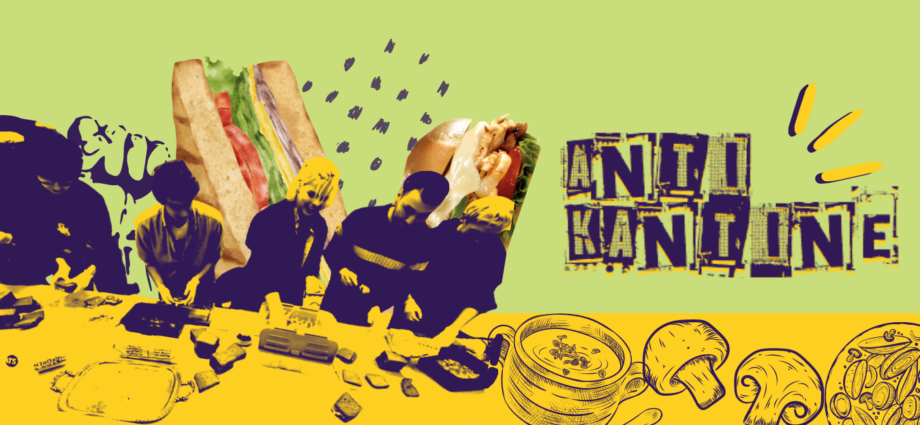Written by Federico Arcuri
“From the 6th till the 10th of March we will be handing out free sandwiches to protest for affordable food, animal rights and food democracy”
With these words, the UvA Student group Anti-Kantine announced their action in the university canteen in Roeterseiland. Privatization of university services across the Netherlands, as well as in other countries, has contributed to a rise in unaffordable housing, food and precarious contracts for staff members, and Leiden university itself is not immune.

Every time I go to the Wijnhaven campus I wonder how it is possible that students need to spend more than 6 euro for what is barely a filling meal. This virtually forces most students to either prepare meals in advance, which then need to be heated up in the one microwave provided in the whole building, or to go to Albert Heijn and buy some snacks or pre-made salads. In the Wijnhaven canteen, it can happen for students to be deceived by the seemingly innocuous self-service salad buffet: if you want to make yourself a barely filling salad, you will not be able to spend less than 7 or 8 €. For many, lunch is the most important meal of the day, and, as students, we need enough nutrients to focus on studying. Why doesn’t Leiden offer affordable food in the university canteen, like other public universities do in other European countries? Is it too much to ask to spend 2-3 € for a fulfilling, healthy and nutritious meal? Isn’t the university able to subsidize food, so that it is accessible for all students, instead of consciously profiting out of the canteens? Tired of the situation, and inspired by the action of AntiKantine in Amsterdam, I decided to interview Vincent, a member of the student group that organized AntiKantine.

What is AntiKantine?
Antikantine is a group of students who “feel like the canteen is unaffordable, there are not enough plant-based options, and that we don’t have a say in its organization. So we started thinking ‘ok, what can we do to change this?’. We decided to organize an action that would include distributing free food for a week, because we realized that it would be an easy way to reach as many students as possible.”

What are the reasons behind your protests?
Vincent shows me a flier, with Antikantine’ three goals: affordable food, animal rights and food democracy. “We have now mainly focused on affordability by challenging the privatization of the university services, in this case the canteen. The university makes a profit by renting out the canteen to an external company, which then rents the university premises out to private restaurants”. On top of this, “the workers at these stands sometimes have precarious contracts, which shows how this is badly organized. Students end up spending 7-8€ for a meal that might not even fill you up, [and] which is not affordable at all on a daily basis.” Otherwise, students have to “prepare food in advance and take it to university, but this also costs time, money and energy. It does not need to be this way, as shown by other countries in which public universities offer affordable meals that can range between 2 and 5 euro.”
Vincent thinks that the university is responsible for this situation. “They don’t care about the fact the food is that expensive, they just care about keeping making profit.” However, one might respond to this criticism by saying that this neoliberal profit-driven logic is not specific to UvA’s, but rather pertains to the government’s economic policies. But then, Vincent argues, it is also true that “the UvA does not do anything to challenge such policies, it does not show any commitment to providing students with affordable food and avoiding privatization of university services. They do not do that because they don’t care, and, on top of this, use these capitalist logics to their own advantage. Thus, it is the university’s responsibility at this stage” to at least show an interest in de-privatising the canteen. “If the problem is at the national level, the university could at least support students’ initiatives, which they didn’t, but rather tried to stop us. Or they could do more to defend student rights at the national level. We know that they are not doing that, because they don’t care enough, so this is their fault and that’s why we are protesting.”
Talking more about the root causes of the university’s privatization, Vincent notes how “Around 20 years ago we already had a mensa with affordable food, and they got rid of it because the university was privatized more and more, under the influence of Rutte’s Liberal Conservative Party and its neoliberal policies and ideology”. Sadly, the UvA’s third-party caterer’s contract was recently extended until 2027, demonstrating the university’s choice of profit over its students’ well-being.
Why did you choose to sell sandwiches in the canteen as your first action?
The protest itself is “a clear example of how the university can provide affordable and healthy food. We are already showing you what we want and how we can organize it in practice. It is not just a protest: we are showing the university that a handful of students can organize a canteen better than private companies. But it is also not our responsibility to run the canteen, we would not be able to do it everyday, and that is what the university should be doing instead”. Vincent says that this helped them to understand that giving out free food is “not so difficult. With enough subsidies, It is doable for universities to provide healthy, vegan and affordable food.”
How did you organize the action?
“The university did not think we would organize it so professionally,” he tells me, smiling.
“Some members of the student group contacted a few restaurants and purchased the ingredients for the sandwiches, which were all pre-made by qualified people rather than by students, which meant that it could meet all food safety standards.” Vincent describes how the food was ordered a week ahead of the action, and then it was assembled on the spot in the canteen. After picking the spreads and vegetables from the restaurant every day, the ingredients would be organized in the UvA common room and then assembled and distributed in the canteen, next to the privatized stalls. This made the whole process transparent, because everyone could see what was going on.
He stresses that they “did not ask for donations during the action, because the main point was for it to be free”. The food subsidies were based on donations from the UvA central student council ( €1,100) and the university’s activist group Amsterdam Autonomous Coalition. “The student council supported us financially because they also tried to pressure the university board with similar demands, with scarce results.” Plus, he adds, “we got good deals from restaurant that were supportive of the idea.”
“And the food was quite fancy!” he tells me proudly, while showing me the action’s menu, which featured sandwiches like hummus with grilled vegetables, baba ganoush with pomegranate seeds, and spinach spread with pumpkin seeds and tomato.

Is the university open to dialogue?
“The university opposed our actions via the security service. I heard someone from the security saying things like ‘yes, i understand you, but we also have responsibilities to the businesses inside here, you are hurting them’. But then I asked, what is the canteen for? The university is for students, not for business.”
“They tried to close all doors to the canteen, they tried to keep us out”. Vincent notes how the security was not there to protect the students, but rather “to protect businesses’ private interests. They wanted to keep us out of our university, from our canteen, because we were sharing free food. We succeeded to get inside the canteen in the end. It is hard for a university to keep its own students outside.”
“The following day we agreed to have a stand outside of the canteen, because we thought that we could still reach many people in this way.” Regardless of the university’s attempt at leaving Antikantine’s students out in the cold, Vincent says that they still “wanted to try to make the best out of that by for instance using music and being very visible so we could gather support for the cause. […] We were outside of the building on Wednesday, then inside the building on Thursday but still outside of the canteen – on both days we reached many people. […] We thought that this was still very problematic, because the canteen is the place were students are supposed to eat. So, eventually on Friday we went back to our canteen.”
What are your hopes for the future?
“We are not sure how this is going to continue. We had a focus group to organize the action and gather ideas about our demands. We are going to start petitions soon as well to pressure the board to change things”. While I am writing this, two petitions have already started, and you can support it here. Vincent notes that this is important to translate the students’ three goals into specific demands for the university to de-privatize the canteen.
Vincent seems satisfied with the outcome of the action, as many students showed up to support it – “on the first day we ran out of food in 15 minutes. This is something that is not very difficult to understand: every student has an interest in affordable food. So it is easy to gather support. But the question now is, does this make it successful in the long run? maybe not, but at least we are trying.”
The reason why I found Antikantine’s action so powerful is its strategy. By handing out free food, these students have shown us how to put into practice their demands. Obstructing the university’s privatization of the canteen through non-violent civil disobedience, also makes it a perfect example of prefigurative politics. As Vincent confirms, Antikantine’s protest itself is “an example of how the university can provide affordable food. We are already showing you what we want and how we can organize it in practice. […] It is not just a protest, we are showing the university that a handful of students can organize their canteen better than private companies. Yet, it is also not our responsibility to organize the canteen, we would not be able to do it everyday, and that is what the university should be doing”. And, as Vincent reminded me while proof-reading the article, “It is actually important to note that we used ‘free labor’ to organize this. Normally you want to pay those who work, and so in that sense, we did not show a viable long-term alternative. Yet still it is possible to pay workers and offer affordable food, preferably by subsidizing, but even a non-subsidized organization would be doing better if there is a not-for-profit approach.”
In other words, students at UvA are showing us that alternatives to the neoliberal privatization of every sphere of life do exist. Not only because UvA students managed to organize an alternative system for a week, but also because other universities already do it! For instance, the Free University of Berlin offers affordable meals, including many vegan dishes everyday, starting from 2 euro. Many other public universities achieve the same results by managing their own food services too.
Thus, the question is – will Leiden University ever provide affordable food in its canteens? Hopefully, students in Wijnhaven will be inspired by their colleagues in UvA to realize that change needs to come from them, if they want it. And recent examples have shown that occupying the university is possible.
Edited by Maurice Wedner-Ross, artwork by Teresa Valle

